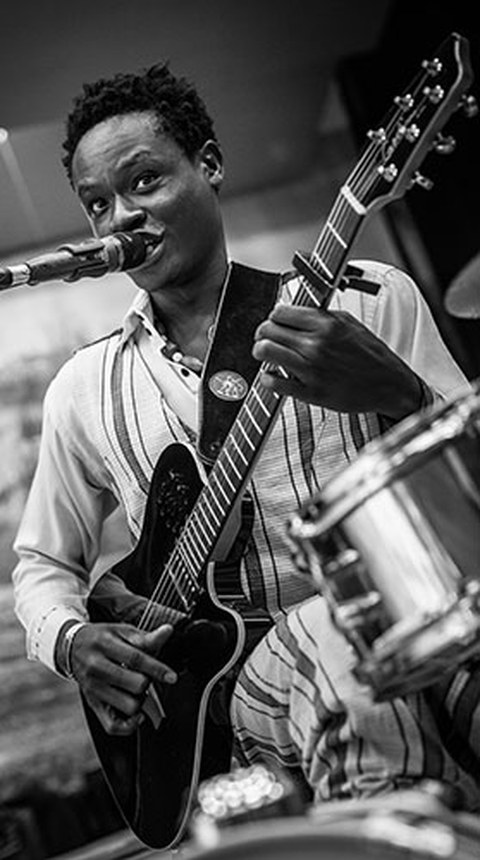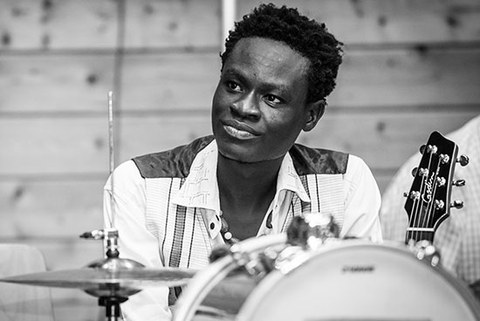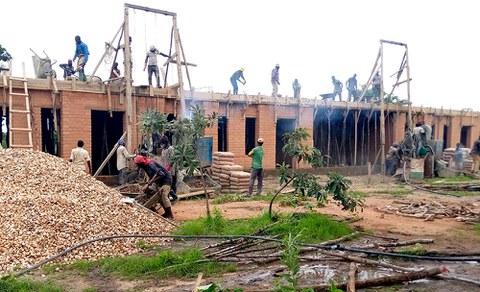Ezé makes dreams come true
(Interview from 2019, with update 2020)
Anne Vetter/Susann Mayer
Distinguished graduate in German studies, passionate musician, and bridge-builder between cultures. Ezchial Wendtoin Nikiema from Burkina Faso is also one of the TU Dresden DAAD award winners. His current project is a school for Gueswendé, a village in Burkina Faso.

Ezé is the November 2020 Alumnus of the Month
In Dresden, Ezchial Wendtoin Nikiema is known to many by his nickname Ezé. The actual pronunciation is "Ezeh," but most people say his name like the word 'easy.' Perhaps because this fits so well with Ezé's joyful personality. At the same time, what the young man from Burkina Faso has accomplished in the past few years is enough to leave you dizzy. In 2016, the 27-year-old started studying for a Master's degree in Linguistics, Literature and Cultural Studies at TU Dresden's Institute of German Studies. Ezé Nikiema graduated with top grades in July 2018. In fall 2017, he developed the theory for his Master's dissertation, "Zur Arbeit mit Musik im DaF-Unterricht: Möglichkeiten und Potenziale anhand einer Fallstudie in Burkina Faso" ("Working with music in German lessons: Possibilities and potential based on a case study from Burkina Faso"). The fieldwork in the West African country followed in December 2017.
As if that weren't enough of a challenge, Ezé Nikiema is committed to improving education and cultural exchange. He founded an association promoting education, arts and crafts in Burkina Faso in 2014 with the aim of setting up a school. In Germany, he runs workshops on intercultural education for children and adults through the "Bildung trifft Entwicklung" project, and is an advisor for the PASCH mentoring program, a German Foreign Office global initiative connecting schools with a strong focus on the German language.

Ezé Nikiema is a passionate musician
Ezé Nikiema is known in Dresden as a passionate musician, and got involved in Banda Internationale – a world music band popular for its commitment to respect, tolerance, and solidarity.
In 2018, Ezé Nikiema received the TUD DAAD award in recognition of his outstanding academic achievements and sociocultural work. The prize, worth 1000 euros, is awarded to international students who make an exceptional contribution to their universities.
He was nominated by Dr. Ulrich Zeuner, a lecturer at the Chair of German as a Foreign Language (Institute of German Studies). "I was consistently impressed with how Mr. Nikiema managed to combine strong academic performance with great social and intercultural work," says Dr. Zeuner. "I had the pleasure of supervising his Master's dissertation. And I mean 'pleasure': It was great to work with such an intelligent, enthusiastic, and well-rounded student. At the same time, Mr. Nikiema was investigating a new area of foreign language teaching, making his work of considerable academic interest."
The hypothesis of his Master's dissertation – that music facilitates foreign language learning – was something that Ezé Nikiema had experienced himself. After graduating from school in Ouagadougou, the capital of Burkina Faso, he decided to study German. However, those studies came to an end when he gained his bachelor's degree in 2013, because there was no master's program. "I worked as an interpreter, but also and above all engaged with music," he says. After traveling across Europe, he gradually formed the idea of applying to study in Germany. "It was a long road," says Ezé. Even back when he received the "Africa Sonderpreis" ("German Africa Prize") for his "Eine-Welt-Song" (“One World Song”) in Berlin in 2015, he would have liked to stay. "Things finally worked out in 2016. I was so incredibly happy!" Since then, he firmly believes that "your dreams will come true if you continue to work to make it so."

Ezé in his home country of Burkina Faso in 2018 with the Dresden band "Banda Internationale"
Now, he seeks to help fulfill the dreams of others – of children. The dream of learning, of solar energy and running water, of going to school. In an interview with "People in Dresden/Leute in Dresden" he explains that "as children, we were allowed to attend school, and I felt very fortunate as education gives you the opportunity to develop. I believe that education is the key to self-fulfillment, peace, and development. That's why I wanted to commit in a major way to working with children. I thought a school would be a very important tool to do something about illiteracy. Last year, Banda Comunale offered its support, and we were able to raise even more awareness of our project 'Eine Schule für Burkina Faso' ('A School for Burkina Faso') through our joint trip through Burkina."
Ezé purchased the land for the school with his song contest prize money and book proceeds. In the summer of 2019, with the support of Dresden's mayor Dirk Hilbert, he launched a major fundraising campaign that raised €24,000, which went towards the costs of the ongoing construction work. The first buildings will be completed in November 2020, and the first school year will begin in 2021.
It was on Ezé's initiative that the association TAM e.V. was founded in Dresden in 2019. He tells us that "TAM wants to build bridges – between Germany and Burkina Faso, and between the present and a sustainable future." People can help by joining or supporting the Centre Warc-En-Ciel project. Centre Warc-En-Ciel is the name of the school, training, and art center in Burkina Faso that Ezé wants to be his contribution to improving the educational landscape in his home country.

Construction work on the school in progress
2020 update:
I am a freelance musician, language teacher, and cultural worker in schools, daycare centers, sheltered workshops, and similar institutions. After graduating, I completed additional training at a school in Berlin and qualified as an integration school language teacher, accredited by the German Federal Office for Migration and Refugees. Unfortunately, I have a lot on my plate at the moment and so I have only had time to pursue music and workshops. This does not leave time for a permanent post at an integration school.
I plan to do a doctorate; I already have a topic and a supervisor. It will be distance learning with Prof. Friedemann Vogel at the University of Siegen. The topic is the image of Africa in German-language aesthetic and multimodal mass media. The wider field is German linguistics (applied media discourse and image linguistics).
And as of 2021 ... the school is finished!
https://www.facebook.com/Eze.Musik/videos/177383560485001
https://www.facebook.com/Eze.Musik/videos/472099827511785
Contact:
Facebook – Ezékiel Nikiema
Web
